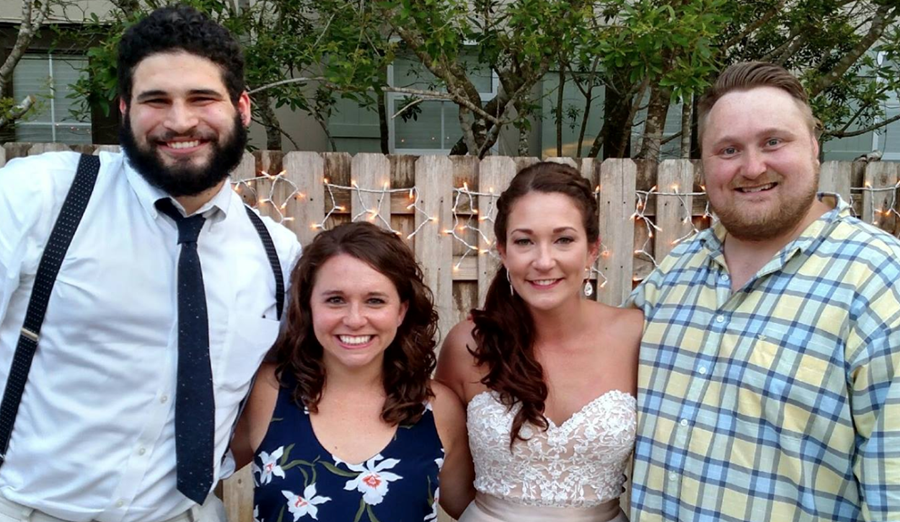Social Leisure Engagement: Participating in Leisure With Others May Affect Well-Being for Students

From right: co-authors and recent doctoral graudates include James Duncan of the University of Arkansas, Kayla Reed-Ftizke of the University of Iowa, Mallory Lucier-Greer of Auburn University, and Anthony Ferraro of Kansas State University. Co-author Matt Withers of California State University Chico is not pictured.
As emerging adults are learning to be independent from their families during their transition to college, they may want to examine the types of activities they in which they participate and whether those activities are done in solitude or in the company of other people.
A researcher from the University of Arkansas in collaboration with researchers from other institutions is finding that social leisure engagement could directly and indirectly be associated with better mental health for emerging adult college students.
"Social leisure engagement is the notion that you are socializing with other people while you are taking part in recreational activities," said James M. Duncan, a recent doctoral graduate of Florida State University and now an instructor in the Dale Bumpers College of Agricultural, Food and Life Science's School of Human Environmental Sciences at the U of A.
In the journal Leisure Studies, Duncan and other recent FSU doctoral graduates and faculty who were part of a research lab, together write that "leisure engagement" can have a meaningful impact on how emerging adults handle adverse situations. This study specifically looks at college-age young adults who are becoming autonomous from their family of origin by transitioning to college as students and how the support of their peers in conjunction with leisure may affect their mental health.
The paper will be published in an upcoming edition of the journal, but is available online now.
The researchers surveyed 270 college students between the ages of 18 and 25 about their frequency of leisure engagement. They also asked students to self-asses their perceptions of peer support, and also rate their perceptions of depressive symptomology. Students who had reported high levels of leisure also reported significantly less depressive symptomology. Additionally, students who had reported high levels of leisure also reported low levels of depression indirectly through high levels of peer social support.
"Although we are learning to be independent adults and make our 'own way' through the world as we launch into college and beyond, engaging in activities with others and feeling connected to and cared for by others as we take part in these activities has a lot to do with how we handle our mental health," said Duncan. "Learning to be independent and autonomous does not mean we have to go it alone and although there are ways to have fun by ourselves we should still make an effort to have fun in the company of others."
Duncan and his colleagues hope to continue this line of work by exploring how leisure influences well-being in other populations. Earlier this year, Duncan published an article focused on leisure among older adults in the Journal of Activities, Adaptation, and Aging and hopes to continue to expand leisure research to populations such as military families.
Other authors on the paper are Matt Withers, professor at California State University Chico; Mallory Lucier-Greer, professor at Auburn University; Anthony Ferraro, professor at Kansas State University; and Kayla Reed-Ftizke, professor at University of Iowa.
About the Dale Bumpers College of Agricultural, Food and Life Sciences: Bumpers College provides life-changing opportunities to position and prepare graduates who will be leaders in the businesses associated with foods, family, the environment, agriculture, sustainability and human quality of life; and who will be first-choice candidates of employers looking for leaders, innovators, policy makers and entrepreneurs. The college is named for Dale Bumpers, a former Arkansas governor and longtime U.S. senator who made the state prominent in national and international agriculture.
About the University of Arkansas: The University of Arkansas provides an internationally competitive education for undergraduate and graduate students in more than 200 academic programs. The university contributes new knowledge, economic development, basic and applied research, and creative activity while also providing service to academic and professional disciplines. The Carnegie Foundation classifies the University of Arkansas among only 2 percent of universities in America that have the highest level of research activity. U.S. News & World Report ranks the University of Arkansas among its top American public research universities. Founded in 1871, the University of Arkansas comprises 10 colleges and schools and maintains a low student-to-faculty ratio that promotes personal attention and close mentoring.
Topics
Contacts
James Michael Duncan, instructor
School of Human Environmental Science
479-575-4305,
jmduncan@uark.edu
Headlines
PetSmart CEO J.K. Symancyk to Speak at Walton College Commencement
J.K. Symancyk is an alumnus of the Sam M. Walton College of Business and serves on the Dean’s Executive Advisory Board.
Faulkner Center, Arkansas PBS Partner to Screen Documentary 'Gospel'
The Faulkner Performing Arts Center will host a screening of Gospel, a documentary exploring the origin of Black spirituality through sermon and song, in partnership with Arkansas PBS at 7:30 p.m. Thursday, May 2.
UAPD Officers Mills and Edwards Honored With New Roles
Veterans of the U of A Police Department, Matt Mills has been promoted to assistant chief, and Crandall Edwards has been promoted to administrative captain.
Community Design Center's Greenway Urbanism Project Wins LIV Hospitality Design Award
"Greenway Urbanism" is one of six urban strategies proposed under the Framework Plan for Cherokee Village, a project that received funding through an Our Town grant from the National Endowment for the Arts.
Spring Bike Drive Refurbishes Old Bikes for New Students
All donated bikes will be given to Pedal It Forward, a local nonprofit that will refurbish your bike and return it to the U of A campus to be gifted to a student in need. Hundreds of students have already benefited.




